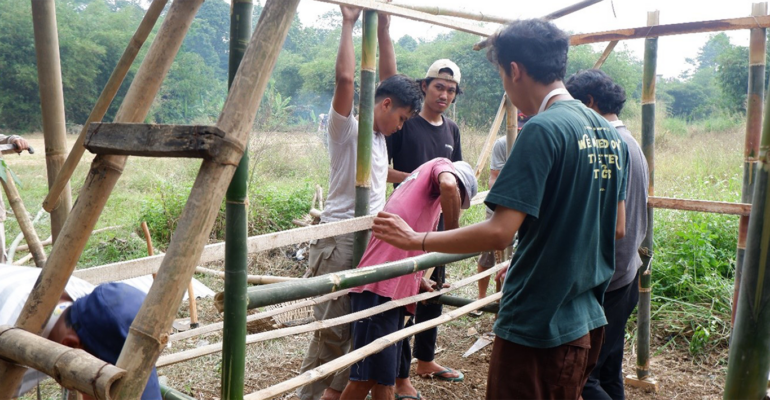Camago House: IPB University Student’s Solution to Turn Organic Waste into Sustainable Resources

In an effort to overcome the problem of organic waste that is increasingly piling up, the concept of “Camago House” is carried by IPB University students as an innovative and environmentally friendly solution. Rumah Camago or Worm and Maggot House puts forward a zero waste approach by utilising these two organisms to process organic waste into sustainable resources.
This innovation was made by IPB University students, the Student Organisation Capacity Strengthening Program (PPK Ormawa) team from the Nutrition Science and Feed Technology Student Association (Himasiter). Rumah Camago is one of the implementations of the Ramah Lingkungan (Rama) programme related to sustainable waste management held in Sinarsari Village, Bogor, West Java.
The programme received full support from the residents and the local government. The support includes labour assistance, land provision, and a plan to issue a policy letter regarding the collection of organic waste by local residents. In addition, the management of Rumah Camago has also been established voluntarily by Munir as the manager of Rumah Camago and Saeful, the chief of RT 4/RW 3.
“The construction of the Camago House is expected to be an example for neighbouring neighbourhoods so that the community can be more encouraged to process organic waste,” said Saeful, the chief of RT 4.
Mutiara Rizkia Nurkamil, a student representative of IPB University explained that earthworms, especially the Lumbricus rubellus species, are used in vermicomposting, which is the process of decomposing organic waste into high-quality compost.
“This fertiliser can be used to increase soil fertility and improve soil structure in agricultural land. In addition, the worms are also able to recycle organic materials efficiently, thereby reducing the amount of waste that must be disposed of in landfills,” Mutiara explained.
Meanwhile, she continued, maggots, which are the larvae of the black soldier fly (BSF), play an important role in breaking down food waste and kitchen waste more quickly and efficiently. Maggots are able to consume organic waste up to five times their body weight in a day. The result of this decomposition is a residue that can also be used as fertiliser, while the maggot itself can be used as a protein source for animal feed.
“The existence of Rumah Camago provides various benefits, from reducing the amount of organic waste, to creating a circular economy. In some areas, these projects have succeeded in driving the economy by empowering local communities to be involved in the process of processing waste into valuable products,” she explained.
For IPB University students, Rumah Camago not only provides environmental solutions, but also opens up new opportunities in the agriculture and livestock sectors. By converting organic waste into useful resources, this concept contributes to the sustainability of nature and the economic welfare of the community. (*/Rz) (IAAS/RSL)



